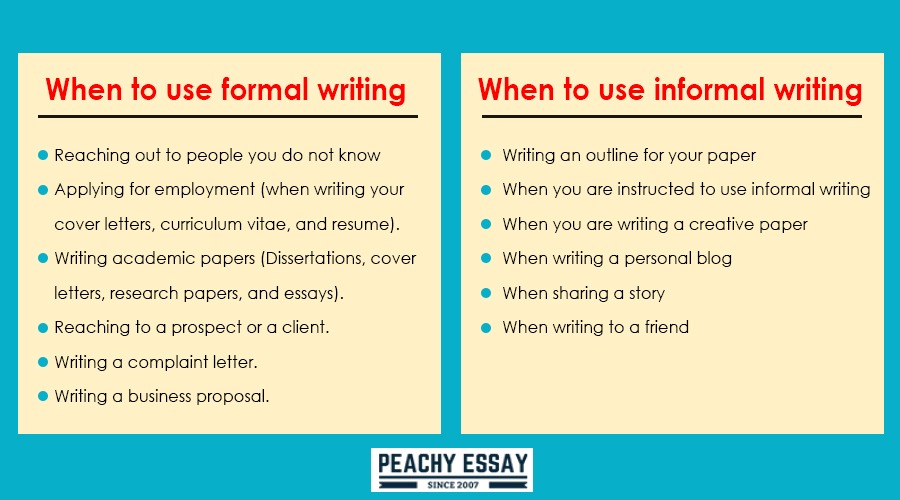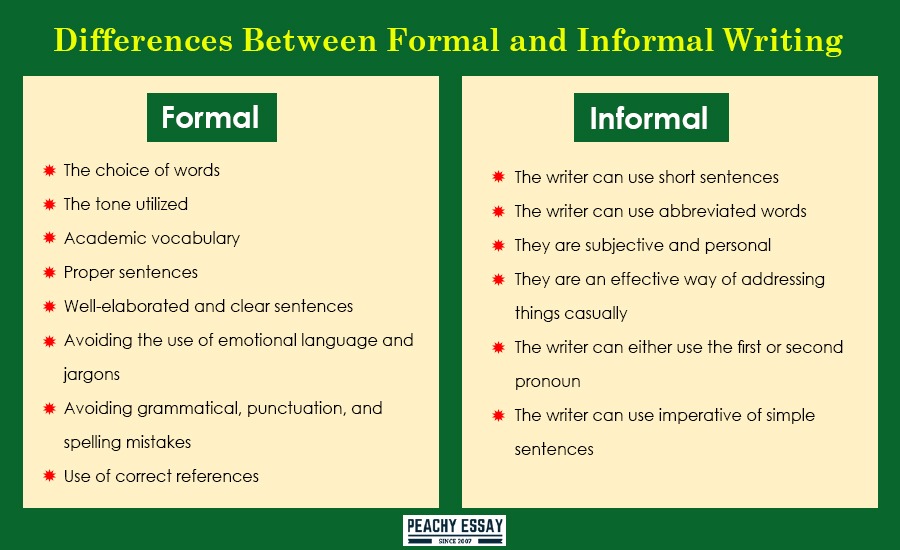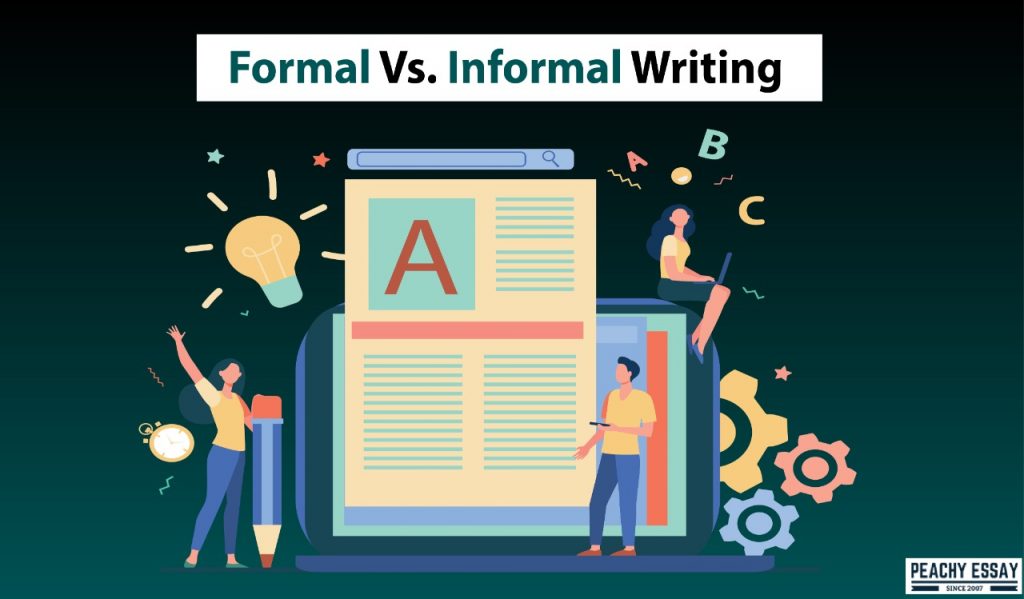Communication plays an essential role when it comes to how people relate to each other. People tend to vary their mode of communication-based on their environment. A vital element of effective communication is minding your audience. You should take time to ask yourself a few questions such as how casual can you be with them as well as how well you know them. This will assist you to know when to use formal or informal writing when communicating with them.
As a writer, you should never forget that deciding on how formal or informal your writing should be can be likened to choosing an outfit. You will need to decide whether you are heading to a gala with a red carpet or to a backyard barbecue. This article will start with a definition of the differences between formal and informal writing. When you are deciding on how to communicate with certain people, you might consider thinking about the following question
- Do you often use the same phrase, words, and tone to communicate with your teachers, guardians, and parents as you do with your colleagues or friends?
I am certain you already know the answer. Well, if you use the same language to communicate with your parents, teachers, guardians, studying colleagues, and friends, the chances are high that you might have difficulties communicating. Different cultures across the world have unique ways of how people are expected to communicate with one another. People who do not take their time to learn and understand how to communicate with one another often have difficulty getting other people to listen as well as understand their desired message. Therefore, if you want people to have less difficulty hearing or understanding what you have to say, you must take your time to learn the different ways of communicating.
Take time to understand your audience
It is essential to understand your audience. When it comes to communicating with other people, the writer should take their time to understand and put into consideration the people they are addressing. Thereafter, it is vital always to remember the reasons why they are communicating. For instance, some people communicate to inform as well as entertain, while others communicate to persuade.
For an individual to decide whether to write formally or informally, they should consider their audience and the primary objective as to why they are communicating. Thereafter, they can settle on the style that will make the audience have less difficulty opening up and listening, and going through the author`s different ideas.
Your audience and the purpose
Generally, how you communicate with your colleagues, relatives and friends is usually informal. However, how you communicate with your lecturers, guardians, parents, and strangers is usually formal.
Communication with the primary objective of entertaining is usually written using informal language irrespective of the audience.
Sometimes, the writer might be forced to use an informal mode of communication for the purpose of informing or persuading co-workers, people in authority, as well as strangers. During such times, you might be persuading or informing your audience regarding a serious topic or issue.
Guide on Formal Vs. Informal Writing
There are significant differences between formal and informal writing. Therefore, learning and having a better understanding of these differences could help you come up with a good piece of writing. It is important to know the differences between the two and when to use each one of them.
One of the differences between formal and informal writing is the variation in the length of the sentences. In informal writing, the writer can use short as well as fragmented sentences while in formal writing, the writer must use convectional sentences that are longer and other times, complex. A good example is that an individual could use “what’s up” while writing a message intended for a friend and use a different type of greeting when writing a formal letter. For instance, an individual might use a form of greeting such as “I hope this letter finds you well.”
The language between formal and informal writing differs significantly. It is essential to note that whereas informal writing an individual could use simply to understand words and it is acceptable to use colloquial, you are all not allowed to use colloquial when writing formal sentences. For example, when writing formally, you are required to use words such as people and children, instead of using folks and kids, which you would have used in informal writing.
Thirdly, whereas you are allowed to use cliché`s in informal writing, it is forbidden in formal writing. You are also required to avoid using abbreviated words in formal writing. It is essential to note that when you are writing an essay, formal letter, a research article, or any form of academic paper, you are not supposed to use abbreviated forms of words since they are often considered inappropriate. For instance, in formal writing, you are not supposed to use shortened words such as pics, TV, can`t, don`t etc. Instead, you will have to write these terms in full such as; television, pictures, cannot, and do not.
Among the differences between formal and informal writing is that an individual could utilize imperative voice. Whereas it is common for close relatives, family, and friends to use imperative voices such as saying “let’s meet at 10” the situation is very different when a student is conversing or seeking permission from the lecturer or in other formal settings. The learner must write, “I request to schedule a meeting with you at 10 in the evening.
Finally, there is a difference in the use of persons. For example, when it comes to informal writing, the writer can address the audience using the first, second, and third person while on the other hand, an individual is only permitted to use the third person when writing formally. However, in special circumstances, an individual is permitted to use the first person, such as when writing business letters.
Defining Formal vs Informal Writing Styles
Formal writing is often used when the writer is unsure about their audience or if the person being addressed a particular message is not known at a personal level. Almost all academic papers utilize formal writing since they are addressed o the lecturer using a serious tone.
Informal writing, on the other hand, consists of short sentences and less serious tones. It is essential to note that informal writing is used in a personalized setting, such as when writing letters, diaries, or a personal journal.

Apparently, if you are not sure about whether you should use formal or informal writing, as a rule of thumb, you should always start with formal writing. After some time, after developing the connection, you can observe how the different side is responding and hence, lessen the formality.
Key Differences between Formal and Informal writing
As mentioned above, there is a significant difference between formal and informal writing. First and foremost, it is essential always to remember that formal writing is often clear, well-organized, and well-framed unlike informal writing, which is a normal conversational or casual form of writing.
Formal writing is used when communicating with an unknown person. It could also be used when the writer knows the other person, but they have not had any conversation. As mentioned above, formal writing is often used when writing business letters, academic papers such as essays, research articles, dissertations and other legal contents.
When it comes to informal writing, it can be used for personal as well as casual communication. It is essential to note that it is acceptable to use colloquial language. The writer is also permitted to use emotional and personal language and tone and they can directly refer to their audience as “you”. Informal writing is mostly used when writing love letters, text messages, notes, and emails to friends, family, and relatively.

It is essential always to remember that formal writing should always be written using a professional tone while in informal writing, the writer could either use emotional or personal tones, which are often regarded as not professional. In formal writing, the writer is not permitted to use interjections while in informal writing, they are permitted.
Which Style is Appropriate?
Once in a while, you might find yourself in a challenging situation when it comes to deciding when to use formal or informal writing. Hopefully, after reading this guide, you will have a better understanding of the differences existing between the two. Before you settle on whether to use formal or informal writing, you should take your time to understand who are your audience. For instance, if you were writing to your lecturer, a prospective client, or an elderly person, it would be best if you used formal language. When writing an email to your client, you would not want them to have the impression that you are not a serious person. On the same note, in formal writing, you are supposed to be cautious about the emotions you express.
In case you are trying to reach out to a person for the first time and somehow you are unsure about the level of formality to portray, it is always best to start with a formal tone. However, as you continue interacting or understanding the person, you might consider being less formal. It would be awkward to start your paper using informal language, only to realize later on that you gave the wrong impression. On the same note, it would be also awkward to demonstrate excessive formality in an informal situation.
To sum it up
Not everyone enjoys the entire process of writing. However, it is essential to note that writing is an excellent way of expressing beliefs, opinions, and facts as well as many other aspects. Writing could either be formal or informal. Both types of writing depend on the audience and the primary objective of communicating. The main difference between informal and formal writing is that whereas informal writing is less professional, formal writing, on the other hand, is professional is usually used in writing business letters and other academic papers such as essays, research articles, essays, and dissertations. Informal writing could be used in writing friendly letters, text messages, and notes meant for personal use. Understandably, sometimes it can be difficult to decide on whether to use formal or informal writing. Hopefully, by reading this article, you will clear all your doubts and hence, increase your chances of delivering your intended message appropriately. In summary, whether to use formal or informal writing significantly depends on the audience and the intended objective. Therefore, it would be best if you were always cautious enough to understand your audience.




